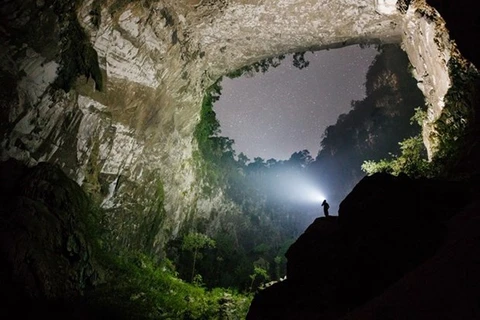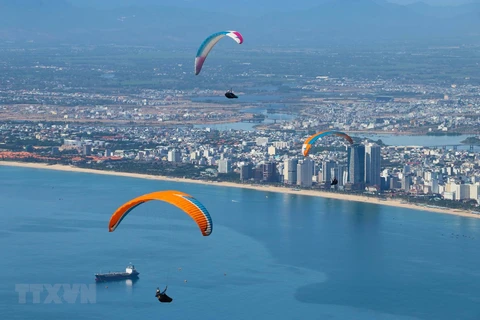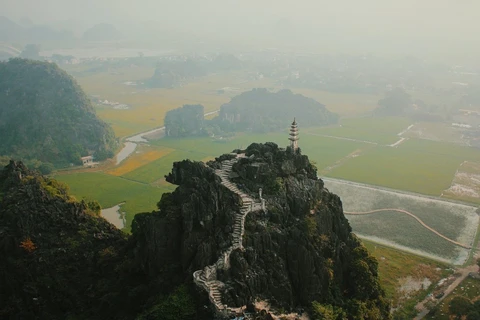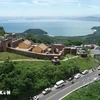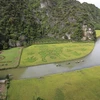 The system of giant stalactites in Thien Duong Cave will inspire visitors’ curiosity (Photo: Vietnam Pictorial)
The system of giant stalactites in Thien Duong Cave will inspire visitors’ curiosity (Photo: Vietnam Pictorial) Hanoi (VNA) – Thien Duong Cave, located in the Phong Nha-Ke Bang National Park – a world natural heritage site, is a popular destination for visitors in the central province of Quang Binh.
Over the last 14 years since its discovery, Thien Duong Cave has always been attractive to tourists thanks to its overwhelming and unique beauty that lives up to its name.
Many people have even given it the best possible names they can think of to describe its irresistible beauty such as “Paradise on Earth” or “Underground Celestial Palace”.
Overwhelming beauty of “Paradise”
Thien Duong Cave, about 70km to the northwest of downtown Dong Hoi city, was discovered by local residents in 2005.
In addition to the characteristics that can also be found at other caves in the Phong Nha-Ke Bang National Park, this cave features a unique and magnificent system of stalactites and stalagmites while boasting a length that can hardly be seen in any others.
The discovery of Thien Duong Cave immediately drew attention from officials, scientists, explorers, and the international community. Shortly after that, a team led by Dr Howard Limbert from the British Cave Research Association organised an expedition to this cave and unveiled extremely surprising initial results.
Formed about 350 – 400 million years ago, it has a length of 31.4km, a height of 60m from the floor to the ceiling, and a width of between 30m and 100m, even 150m in some places.
As an experienced explorer, Howard Limbert believed that this could be the longest cave in Asia and features unique beauty beyond human imagination, and that it is a blessing of the nature for human beings.
Given this, members of the expedition team decided to name this cave Thien Duong (Paradise).
Exploring the mysterious 7km section of Thien Duong Cave
Before starting the tour of Thien Duong Cave, the guide provided us with basic information about the trip, and each was given a head torch and a pair of specialised sandal.
After finishing the 1km of the cave that has been opened for tourism, we began moving further and had to turn head torches on so as to explore the next 7km of Thien Duong.
[Exploring stunning beauty of Tien Cave in Quang Binh province]
On the first 500m, water vapour went up from the ground, making the space inside the cave fanciful. We also saw stalagmites in various shapes around us. The deeper we went into the cave, the more diverse and colourful stalactites appeared.
We accidentally met a group of foreign tourists on their way out of the cave. Joyfully greeting us, they encouraged us to go further as many more interesting things were waiting for us ahead.
Given more momentum, our group continued weaving our way through spaces so narrow that we had to turn our bodies aside or even bow down to the ground.
 In this trip, visitors will be led by tour guides and provided with information about the formation of stalactites and stalagmites (Photo: Vietnam Pictorial)
In this trip, visitors will be led by tour guides and provided with information about the formation of stalactites and stalagmites (Photo: Vietnam Pictorial)  Each visitor will be equipped with a head torch to explore Thien Duong Cave (Photo: Vietnam Pictorial)
Each visitor will be equipped with a head torch to explore Thien Duong Cave (Photo: Vietnam Pictorial)  The deeper tourists go into the cave, the more diverse and colourful stalactites and stalagmites appear (Photo: Vietnam Pictorial)
The deeper tourists go into the cave, the more diverse and colourful stalactites and stalagmites appear (Photo: Vietnam Pictorial)  Visitors need both physical and spiritual strength to explore the next 7km of Thien Duong Cave (Photo: Vietnam Pictorial)
Visitors need both physical and spiritual strength to explore the next 7km of Thien Duong Cave (Photo: Vietnam Pictorial)  The “Gieng troi” (Skylight) area is the only place inside Thien Duong Cave that light enters this 7km section, and it is also the end of the trip (Photo: Vietnam Pictorial)
The “Gieng troi” (Skylight) area is the only place inside Thien Duong Cave that light enters this 7km section, and it is also the end of the trip (Photo: Vietnam Pictorial) Thanks to light from head torches, we not only enjoyed stalactites in various shapes like pyramids, terraced fields or strips of silk but also saw sparking rock formations under our feet.
Reaching a slippery area to access a stream inside the cave, we had to put our belongings inside plastic bags and roll up pant legs to wade through the stream. In a place with neck-deep water, we even had to raise belongings above our heads to move. Passing the stream that is about 100m long, we came to the dome believed to be the cave’s tallest section.
At the “Gieng troi” (Skylight) area, which is also the end of the journey, the afternoon sunlight entering here made the landscape inside this cave fanciful.
We finished our journey in the late afternoon. Though we were relatively tired, the experiences during the 7km-long trip help us become closer to the nature and realise that the nature always promises mysterious and interesting things for humans to explore./.







